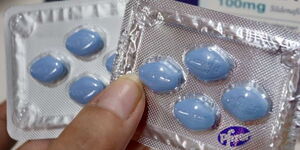Kenyans battling chronic illnesses like diabetes, cancer, and infectious diseases could soon pay less for their medicines, following a new collaboration between the Ministry of Health and global pharmaceutical company Pfizer.
In a statement on Monday, June 24, the ministry confirmed that the country had joined the ‘Accord for a Healthier World’ initiative by Pfizer that will see the cost of 140 medicines, used to treat these diseases, being slashed by 60 per cent.
In Kenya, patients with these diseases face significant financial burdens in accessing medications. For example, a spot check by Kenyans.co.ke found that diabetic patients spend about Ksh27,169 yearly on drugs. If drug prices are cut by 60 per cent, the average annual expenditure for patients would drop to Ksh10,867.
On the other hand, cancer patients spend an average of Ksh600,000 annually on medication, so after a 60 per cent discount, the patient will end up spending around Ksh360,000 annually.
The same applies to patients suffering from infectious diseases such as HIV/AIDs, Tuberculosis (TB), and malaria, which continue to be among the leading causes of mortality in the country.
According to the Medical Services Principal Secretary Ouma Olunga, who confirmed the partnership, the initiative will be fundamental in ensuring equitable access to quality medical products for all Kenyans, especially those residing in underserved areas.
Through the partnership, the PS revealed that the government will equip healthcare facilities with new advanced therapies to ensure that individuals suffering from these diseases access quality and timely healthcare in line with the Universal Healthcare Coverage (UHC) goal.
“We are signing this Accord to reduce the cost burden on our patients and ensure lifesaving treatments are within reach for all. This is a bold step in delivering health equity,” said Oluga.
"This collaboration provides an opportunity for Kenyans to access some of the most innovative therapies available for diseases affecting them, including cancer, other Non-Communicable Diseases (NCDs), and infectious diseases," he added.
The announcement comes days after the World Health Organisation (WHO), in a report on June 10, warned that Kenya lacked essential medicines and technologies for the management of NCDs, such as cancer, diabetes, cardiovascular diseases and chronic respiratory illnesses, which are responsible for over 50 per cent of hospital admissions in the country.
According to the UN agency, despite Kenya having successfully engineered guidelines for the management of NCDs, the infrastructural capacity to put the guidelines into action is still not there.
In 2021, a total of 115,900 NCD deaths were recorded in the country, according to the WHO's report.












